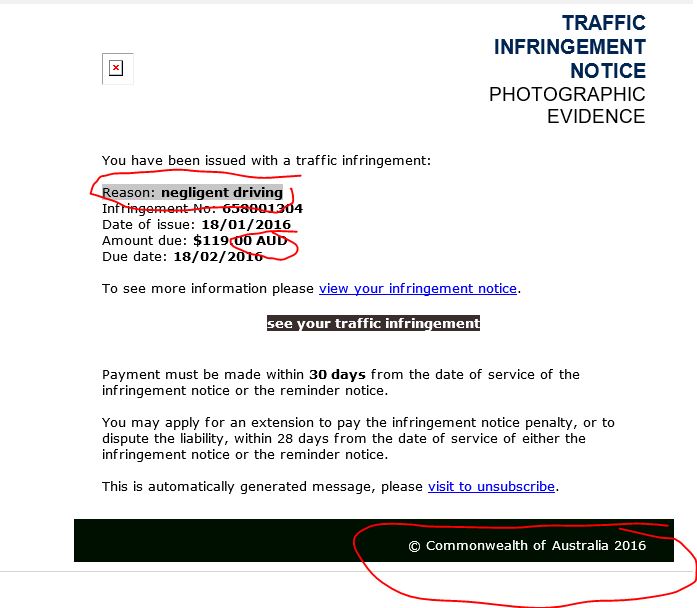While we’ve been enjoying a great kiwi summer, it seems the virus writers and hackers have been busy. They’ve unleashed new variant’s of the ransomware viruses, but this time the old trick of looking for poor English isn’t working – the language looks more credible. Examples we saw yesterday include the traffic infringement notice below, links to files allegedly on dropbox, and alleged unpaid invoices (from unknown suppliers).
There are still some clues that you might notice. The ‘from’ address looks a bit strange – the one below came from an Argentinian email address. And if you hover your mouse over the hyperlink, you can see the real link that it goes to – in this case a Russian server (.ru) Oh, and how would a traffic photo be able to link your car to an email address assuming in this case it’s a rental car and not your regular license plate? Or indeed, an unsubscribe notice on a traffic ticket?
[header2 text=”Still, it is compelling enough to excite your curiosity – and that’s all they need.” align=”left” color=”#00cfef” margintop=””]
So, why doesn’t the antivirus software stop it? Simple -these viruses change literally all the time. And although we work extremely hard to keep our client’s virus software absolutely up to date, there will always be a period between a virus being released and the signatures being made available to us, and then we still have to push them out to client’s machines. The antivirus software we use does have the ability to track virus-like activity, but we have to be careful with how much we use this as it has the effect of slowing computers down – and no one wants that – so we have to get the balance right. Likewise, we can also lock down PC security but again, that often has detrimental impacts on various software tools that people need to use to get their work done – again a need to get the balance right.
So, while we do our best to keep machines safe, the practical reality is that no one can stop every virus, we can only ever reduce the risk, and a huge amount of work goes into that. Ultimately, computer users still need to be careful when they receive unexpected emails, both from unknown, but also sometimes known email addresses. If you’re not sure – always check! We’re always happy to help!

